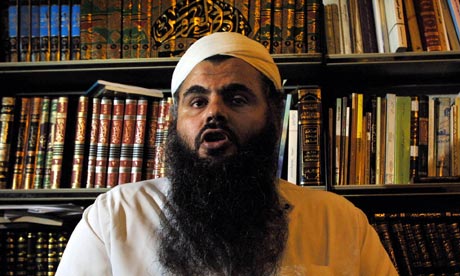Abu Qatada deportation blocked in human rights court
Strasbourg judges stop UK from sending radical cleric back to Jordan because of risk of trial on torture-tainted evidence
The Abu Qatada ruling casts doubt on the credibility of the British government's policy on international terror suspects. Photograph: AP
The European court of human rights has blocked the deportation to Jordan of Abu Qatada – who has been called Osama bin Laden's right-hand man in Europe – because he risks facing a trial based on torture-tainted evidence.
The Strasbourg judges upheld the British government's strategy of attempting to deport international terror suspects to countries which have given diplomatic assurances that they will not face torture or inhuman or degrading treatment.
But in a ruling published on Tuesday the human rights court said there remained a real risk that evidence obtained by torture would be used against Qatada, or Omar Othman as he is also known, and that would amount to a "flagrant denial of justice".
The human rights judges say that in Jordan torture and the use of evidence obtained by torture in the courts is widespread
The ruling means that Qatada could apply for bail within days to be released from Long Lartin maximum security prison in Worcestershire. It is expected that the Home Office will try to insist on the strictest possible bail conditions, similar to a new form of control order that would place him under house arrest for part of the day.
Although the Strasbourg judges upheld Britain's "deportation with assurances" agreement with Jordan, their decision to block the removal of the most high-profile international terror suspect remaining in the UK must put a question mark against the credibility of the strategy. The ruling says that the failure of the Jordanians to give a specific assurance that torture-tainted evidence would not be used against Qatada means he should not be sent back.
More than a decade after 9/11 there are about half a dozen remaining terror suspects that Britain is trying to deport to countries, including Algeria and Egypt.
Qatada, a Jordanian national born in 1960 near Bethlehem, was first detained in Britain in 2002 under the "Belmarsh" legislation as an al-Qaida suspect. He has been convicted in his absence in Jordan of being involved in two terrorist conspiracies in 1999 and 2000 to carry out bomb attacks. The human rights court ruling says that the evidence of his involvement was obtained by torturing one of his co-defendants and there was a high probability it would be used at his re-trial and that it would be "of considerable, perhaps decisive importance".
The ruling says: "In the absence of any assurance by Jordan that the torture evidence would not be used against Mr Othman, the court therefore concluded that his deportation to Jordan to be retried would give rise to a flagrant denial of justice in violation of article six." Article six of the European convention on human rights covers the right to a fair trial.
Shami Chakrabarti, the director of Liberty, said: "The court found that torture and evidence obtained that way is widespread in that country. So it is clear that if Abu Qatada is to be tried for terrorism, this should happen in a British court without further delay."
Amnesty International warned that the court's ruling on "diplomatic assurances" was an alarming setback for human rights. Its expert on human rights and counterterrorism, Julia Hall, said: "The European court has firmly declared that a person cannot be deported to stand trial in a proceeding where evidence gained through torture is likely to be admitted. The court concluded that the use of torture evidence is illegal, immoral, and nullifies the right to a fair trial.
"This positive development is eclipsed by the court's conclusion that diplomatic assurances can, under certain circumstances, be sufficient to reduce the risk of torture. This is an alarming setback for human rights."
The home secretary, Theresa May said: "I am disappointed that the court has made this ruling. This is not the end of the road, and we will now consider all the legal options available to us. In the meantime, Qatada will remain in detention in the UK.
"It is important to note that this ruling does not prevent us seeking to deport other foreign nationals."
David Cameron will next week tell the Council of Europe that the European court of human rights should stop acting as a court of appeal for national judgments and instead focus on cases from some of its 47 member states with less impressive records on human rights than Britain. In a speech to the winter session of the council's parliamentary assembly in Strasbourg, the prime minister is expected to cite the case of Abu Qatada as an example of the need for reform.
"We have been talking for some time about reform for the European court of human rights and we are using our presidency of the council to try and make some progress on that issue," a spokesman for the prime minister said.
"In particular there is this massive backlog of cases that we want to address – 160,000 cases, which is a significant backlog. It suggests that something isn't working quite as it should be. One of the most important issues is to make sure the court focuses on the cases that it should rather than essentially just being a court of appeal for national judgments. But the PM will say more about that agenda next week."


No comments:
Post a Comment